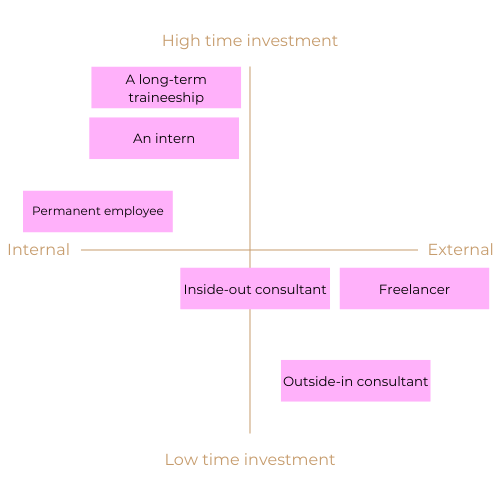
SOS Talent! 6 different ways to attract young talent
The assignments are pouring in. You are urgently looking for talent to strengthen your organization. You need reinforcement to make an impact. Do you opt for talent on a short or long term basis? Are you looking for an external party to match your company with the right people? Or will you go for an in-depth, internal traineeship for starters? Use these insights to make an informed choice and choose talent that brings change.
Training talent costs time and money

There are several ways to start looking for new employees. Before you start looking, it is best to answer the following two questions:
- Do you opt for a large or small time investment?
Do you go for internal or external parties to support your company?
There are several ways to find those employees. Read on and discover the many options for finding young talent.
1. Interns
Interns are brimming with enthusiasm. They are curious and want to prove what they can do. But supervising an intern requires a high, internal time investment that is not always possible.
Pro
- Interns work unpaid for an organization and are therefore financially beneficial.
- Interns are eager to learn. The newly acquired knowledge is fresh in their minds, so they want to apply as much of it as possible in practice.
- Do interns perform well during their internship? Then you can offer them a job afterwards and you are already sure that they have the skills you need.
Con
- Internships are usually imposed by the school and therefore not the student’s own choice. There are of course exceptions.
- Students switch between internships and other school opportunities, so their focus is not 100% on the job.
- Internships are short term, making it difficult for interns to prove themselves. Moreover, there is sometimes a lack of external support to follow up on their development.
2. A new, permanent employee
If you choose a permanent employee, you are making a long-term investment. You employ someone for a fixed number of hours per week, after which you pay a fixed salary each month. This internal approach costs time and money. Not ideal if you are looking for a temporary worker who needs to be up and running quickly.
Pro
- Employees are the foundation of a well-functioning team.
- When someone takes on certain tasks internally, you ensure a streamlined process of fixed tasks.
- You build internal knowledge thanks to the expertise of permanent employees, who later pass on their knowledge to future employees.
Con
- It is expensive and time-consuming to find suitable profiles. Moreover, as an employer you bear the cost of training, illness, leave and, if not performing well, dismissal.
- Internal employees are often tied to a specific task package and are therefore less flexible.
- Permanent employees question the status quo less because they have the same function for a long time. For this reason, it can be more difficult to bring in innovative ideas.
3. A long-term traineeship
Another option is to set up a qualitative traineeship. You give young talents the chance to develop into the potential positions you have in mind. Do you choose this option? Then these tips will undoubtedly help you.
Pro
- There is a choice: if the young talent is not a match after the traineeship, you do not have to offer them a permanent contract.
- You have a group of young talent that rotates within different projects or departments. They can be deployed flexibly and thus facilitate collaboration across the entire organization.
- If you set up a well-developed traineeship, your organization becomes more attractive on the job market.
Con
- The set up of a qualitative traineeship requires a large, internal time investment.
- Finding and developing talent is time consuming.
- There is no guarantee that young talent will stay in your organization after the traineeship.
4. A freelancer
If you don’t feel up to putting in a lot of time internally to find new workers, you can use an external freelancer.
Pro
- Freelancers are flexible. Large projects or small temporary assignments? It does not matter!
- Freelancers have a wide network of expertise which they draw upon.
- Freelancers often choose their assignments very consciously. They have a deep knowledge of their field and work independently.
Con
- Freelancers are flexible, but can end the collaboration at any time.
- A freelancer does not know the company culture and must first familiarize himself with the organization to do a good job.
- A freelancer can not count on the support of an underlying company.
5. An outside-in consultant
Those who want an outside view from an expert on a particular process, problem or assignment regularly choose an outside-in consultant (e.g. Big Four). They come as an external team with the necessary expertise to support transformation.
Pro
- These consultants bring expertise and provide much-needed answers to internal questions.
- They rely on a senior support system from their internal organization and bring validated tools and methodologies.
- They provide an outside view of ongoing processes and often have more say than internal employees.
- Does the consultant not deliver a good job? Then there is a support system behind them to adjust their performance.
Con
- Outside-in consultants come in at a high hourly rate and have less connection and feeling with your organization.
- They propose solutions that they can deliver themselves and are therefore less objective.
- You are hugely dependent on these consultants. In general you also need them for the implementation and follow-up of their proposal. Mission completed? Then you also wave goodbye to the knowledge.
- Employees are sceptical of these consultants because they are not part of the organization.
6. An inside-out consultant
Do you opt for inside-out consultants (Ormit Talent)? This means you are, as an organisation, more in the driving seat. Together with the organization responsible for the consultants, you determine the profile you’re looking for. This way you get talents on board who are completely ready to work on your projects. They are part of your team for the duration of their project, just like your other employees.
Pro
- These consultants are linked to your company on the basis of skills and personality. They can be deployed on a project basis or provide extra capacity at short notice.
- An inside-out consultant offers a fresh, external view on the ongoing processes and is considered part of the team. The focus is on knowledge building of the internal processes.
- The performance of these consultants is closely monitored and fine-tuned by a coach in their support system.
- Are they doing a good job? Then you can offer them a job after the end of their contract.
- It requires a lower time investment to find strong talent than people with years of experience.
Con
- These consultants have to settle in because they are not part of the internal organization.
- They are not tied to the organization and can leave after the project is completed.
- An inside-out consultant is has more general knowledge and less in-depth expertise. This is built up during the project.
The benefits of hiring an Ormit Talent as a consultant
Ormit Talents are inside-out consultants, ready for the field. Because they possess excellent intelligence as well as empathy, they bring change to your organization. They propose a plan of action and make it happen with their hands-on mentality and optimism.
The right match is important
Whether you choose an intern, a permanent employee, a traineeship or a consultant, it is always necessary that you are involved in the selection process. Because in addition to intelligence, personality plays a major role.
Ormit Talents are driven enthusiasts and are ready to bring change to organizations. Whether it’s for the long or short term, at Ormit Talent we offer you an inside look at every step of our search for the perfect match for your organization. Because those who know how things work stay in control. At any moment.